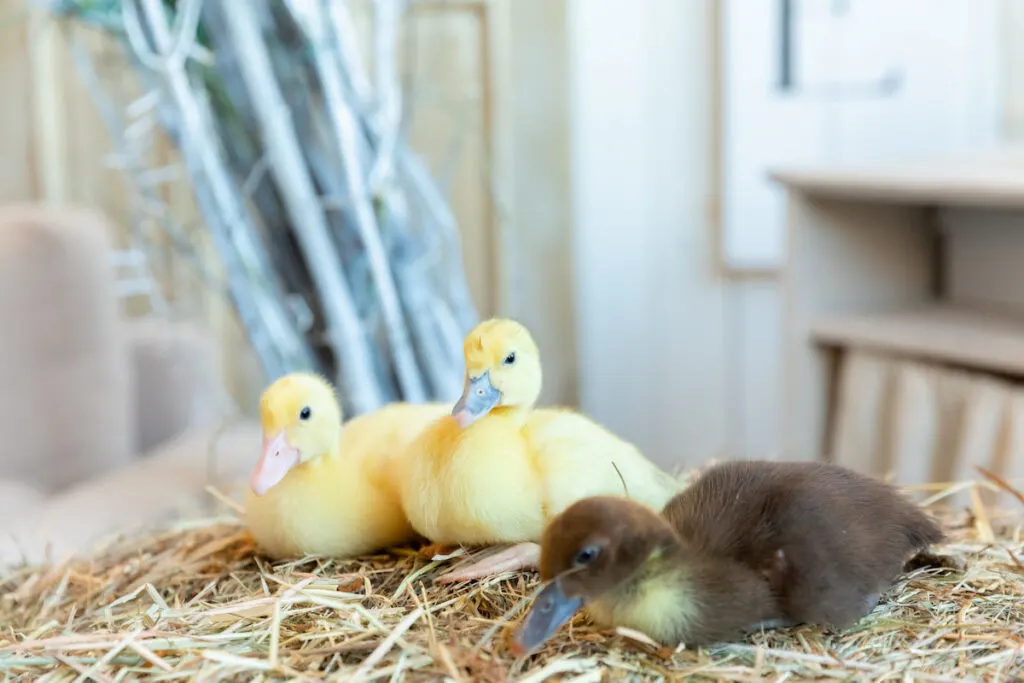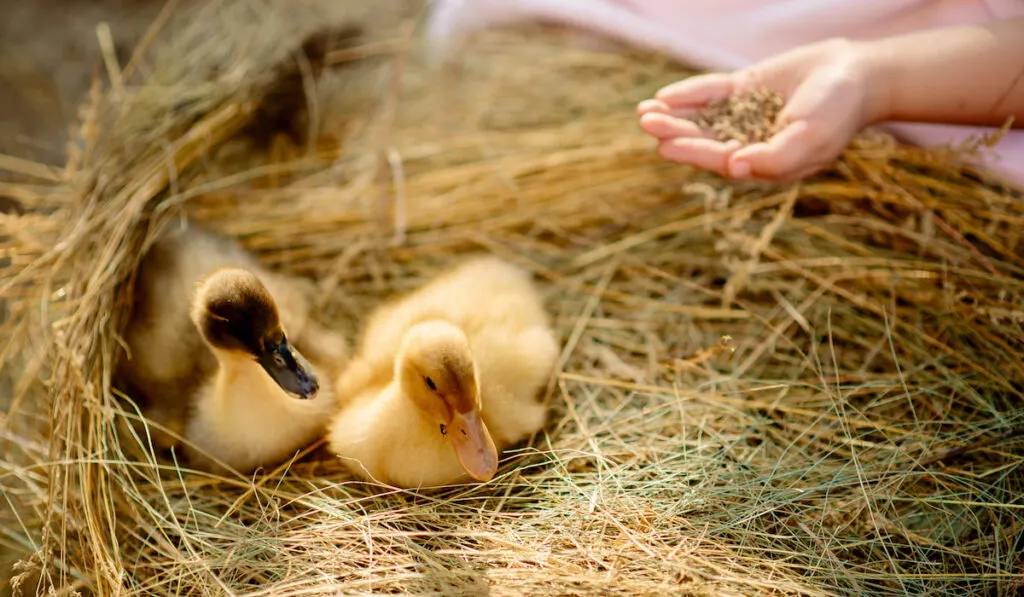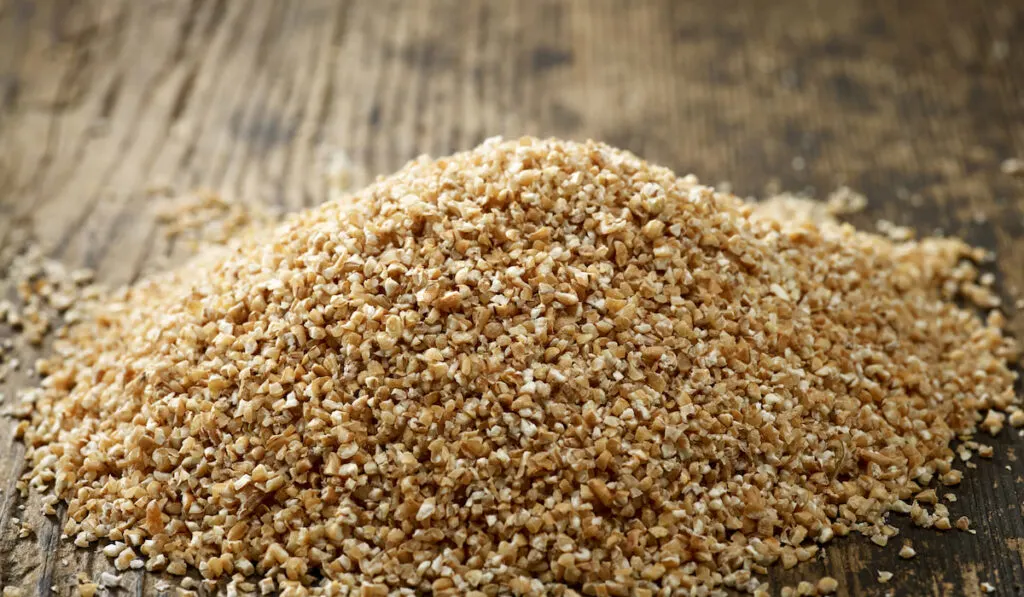Everyone who raises birds want their birds to grow healthy and fast. For birds to grow, they need a balance of the right foods and nutrients. When raising chickens, people usually add grit to help the chickens digest their food. But raising ducklings is not necessarily the same as raising chickens.
Do ducklings need grit?
Ducklings must have grit if they are eating anything other than commercially available starter feed. Grit is the major component of the gizzard of a duck and helps them digest their food properly. The gizzard (or mechanical stomach) is where feed is ground in the digestive system of birds.

Ducklings lack teeth or a means to break down their food when they are eating. Most of the food breakdown process occurs in the gizzard. Without grit, the gizzard cannot grind feed that is hard and difficult to digest.
Knowing that ducklings require grit supplemented in their feed is just the start. Let’s explore the importance of grit, grit types and availability, and special considerations to ensure proper use.
Table of Contents
Ducklings and Grit
Grit is a material made with crushed stone and other additives fed to birds such as ducks and chickens to aid digestion.
Ducklings require grit if they are eating feed other than processed pellets. This is especially important if they have a diet made up of mostly commercial feed or if they are not foraging for their own food.
How Does Grit Work?
What do you plan to eat later? You will probably chew your food before you swallow it. If you do not chew, the food might not pass through your digestive tract easily or digest properly. Your teeth make this action possible, but duck bills do not have teeth to help them break down their food.
The gizzard is an organ attached to the digestive system of birds (and some animals). The gizzard’s motion helps break down tougher foods including hard feed, seeds, nuts, and grains.
Grit is important in the gizzard because the tiny pieces of rock create friction and help the motion grind food down effectively.
What is Grit Made of?
Grit is mostly made up of crushed stones and pebbles. When ducks forage, the grit can be comprised of sand and other natural roughage found on the ground. Both natural and store-bought grit can also contain:
- Silicate
- Limestone
- Sandstone
- Cuttlebone
- Oyster shell
How Do Ducklings Get Grit?
Ducks peck on the sand, stones, and dirt in the soil and swallow the hard materials as grit. Grit collects in the gizzard after a duckling swallows it. There, the grit works to break down the food.
If you allow your ducks to move freely, they will find and swallow the amount of grit that they need for their diet. However, you can also provide extra grit mixed with their feed if your ducklings are not foraging on their own.
Now that you understand the importance of grit to a duckling’s digestive health, let us discuss how you can make sure they get the right type and amount of grit.

Feeding Grit to Your Ducklings
Grit is essential to proper digestion for ducklings, especially if they are eating more than just commercial pellet feed. Grit helps natural foods break down properly.
To supplement grit in a duckling’s diet, you need to consider how to feed grits to your ducklings, where to get grits, and the right timing to add grit to their feed.
Where to Get Grit for Your Ducklings
Most grit is not specifically made for ducklings, but grit marketed for chickens will work just fine. Grit can come with different coarseness, so be sure to purchase grit marked for chicks with your ducklings and grit used to feed adult chickens for adult ducks.
- Necessary For Digestion – Made up of insoluble crushed quartzite or granite, grit remains in the bird’s gizzard to help with digestion. Grit is an essential part of your bird
- Age to Give – Grower Grit being the appropriate size from 8 weeks to 20 weeks. Introduce to developing layer pullets and roosters at approximately 8 weeks of age.
- Available In Different Sizes – Scratch and Peck Feeds Cluckin’ Good Poultry Grit is available in three convenient sizes: Chick, Grower, and Layer. Offer Layer Grit either free choice in a separate dish or tossing on the ground in their coop.
You can get grit for online stores and a poultry or farm supply stores. Look for grit the right size for your animals and with as few ingredients or additives as possible.
- Scratch and Peck Feeds : This brand uses crushed granite and quartzite to make grit. It is for birds that are at least 8 weeks old.
- Manna Pro Poultry Grit : This grit includes crushed granite and is safe for use with ducklings from 3 weeks of age.
- Purina Land O'Lakes 0044570 Grit Supplement : This grit is better suited for adult ducks and includes slightly larger pieces of crushed granite.
When Should You Start Giving Ducklings Grit?
Ducklings need to be at least 3 weeks old before you start giving them grit. As a general rule, you should not give them grit if all they eat is starter feed. Starter feed, or pellet food, is made for ducklings to digest easily.
If you give your ducklings treats, seeds, grains, or nuts, you should provide grit to help their stomachs break down the food. This is especially important if you are giving treats to the ducklings that are not also foraging and getting natural grit, such as sand, in their diet.
How to Feed Grit to Ducks
Ducklings will naturally feed on grit provided in their environment. If natural grit, such as tiny pebbles or sand, is not available, the ducklings will feed on grit you place in a separate feed container.
You can also mix grit into the feed itself. However, this is not recommended because the ducklings can’t regulate how much they eat as part of their food.
Allowing your ducklings to forage and move freely in an area with natural grit is a great way to encourage them to feed properly. Ducklings will intuitively peck at sand and other grit materials to aid their digestion.
Do Ducks Excrete Grit?

If grit is made of indigestible materials such as sand or granite, ducklings will excrete grit once it wears out in the gizzard. This typically happens naturally once the particles become worn or extra fine, no longer providing useful friction for digestion.
For digestible materials such as cuttlebone, oyster shell, and calcium carbonate (limestone), ducks digest the grit, break it down, and collect calcium from it. Calcium is a nutrient that gives birds strong bones and is also used in egg formation to produce hard eggshells.
Final Thoughts
Grit is necessary for ducklings (and full grown ducks) to properly digest their food. Grit is made up up crushed stones or sand and aids digestion by helping break food down in the gizzard. It is important to make sure grit is included either naturally or as an additive for ducklings and that the grit is the right size.
Do you feel more confident making sure your ducklings have grit in their diet? How do you feed grit to your ducks? Share your thoughts in the comments section below.
